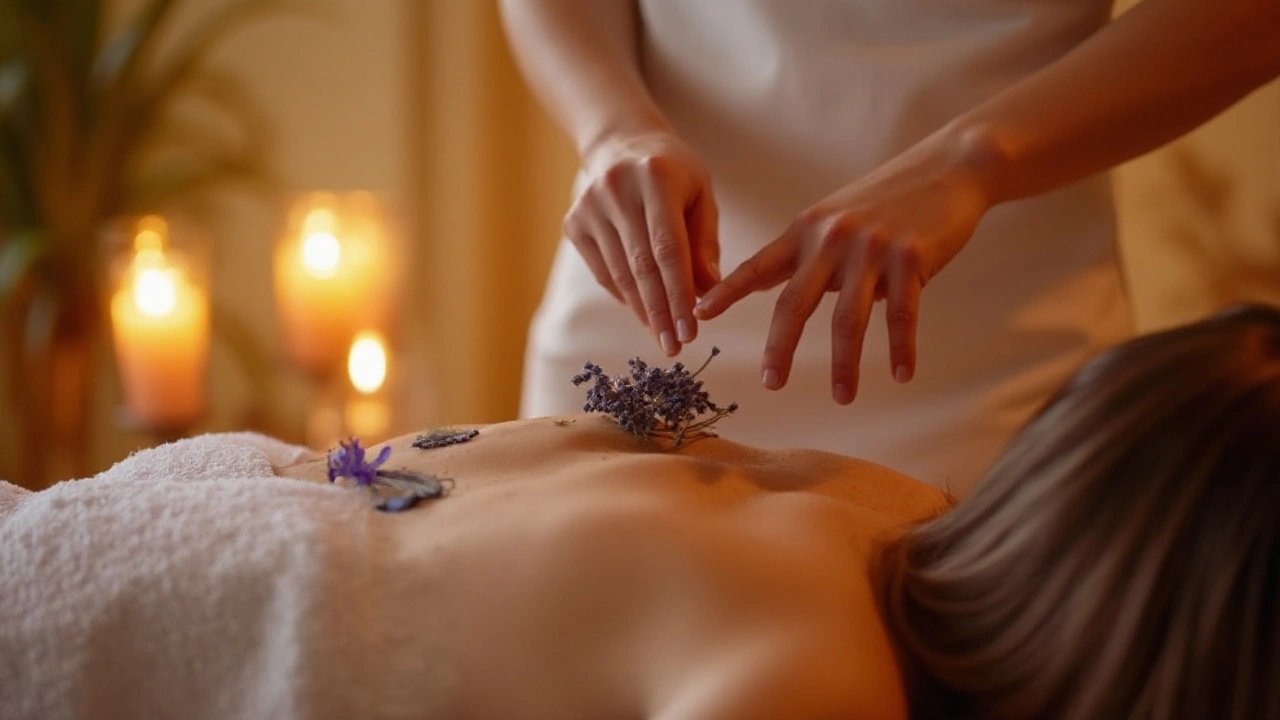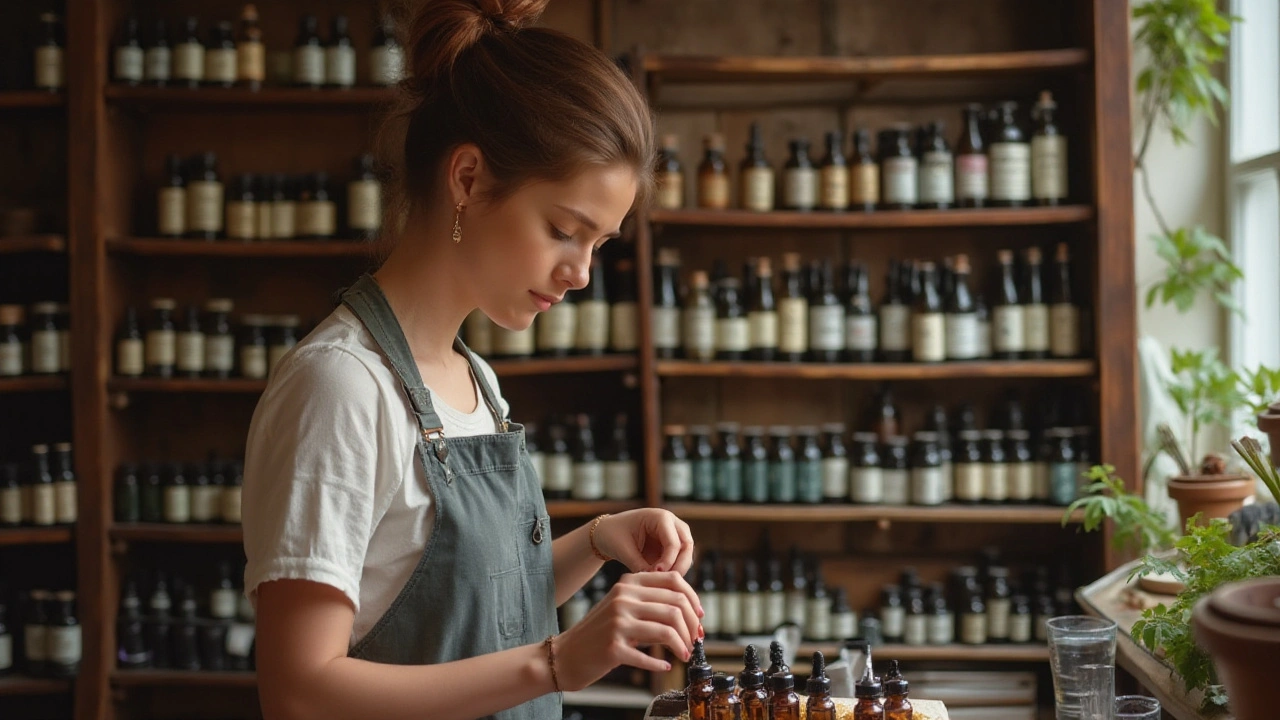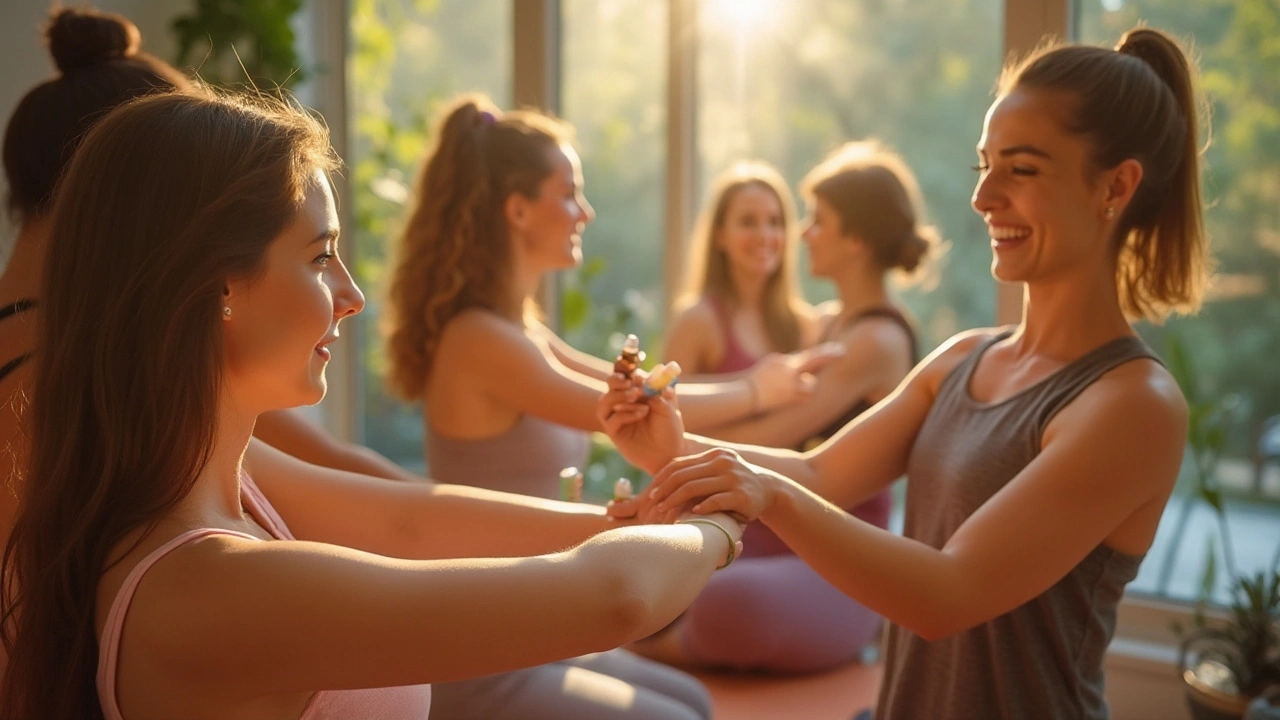Discovering the Benefits of Aromatherapy Massage for Health and Well-being
 Jan, 13 2025
Jan, 13 2025
Aromatherapy massage is more than just a spa treatment; it's an immersive journey into relaxation and healing. As an ancient practice, it has been revered for its ability to blend the physical benefits of massage with the potent effects of essential oils. Each session can be uniquely tailored to suit individual needs, making it a versatile choice for wellness enthusiasts.
Imagine the gentle hands of a therapist working on your tense muscles while the fragrant aroma of lavender or eucalyptus fills the air. This dual-action aids in reducing stress, alleviating pain, and promoting a sense of calm. Whether you're seeking to rejuvenate your body or uplift your spirit, aromatherapy massage offers a pathway to holistic health.
- Introduction to Aromatherapy Massage
- Essential Oils and Their Benefits
- Techniques and Practices
- Health Benefits
- Mental and Emotional Advantages
- Tips for an Effective Session
Introduction to Aromatherapy Massage
Aromatherapy massage is a therapeutic technique that uniquely combines the physical prowess of massage with the soothing properties of essential oils. This blend creates an experience that is both invigorating and restorative, making it a popular choice for those seeking both relief from physical discomfort and mental tranquility. Dating back thousands of years, perfumes and oils have been used in healing rituals across various cultures, including ancient Egypt, China, and India. These oils were once considered treasures, not just for their pleasing scents but for their curative prowess as well.
One might imagine this practice emerging in a time when nature's bounty was closely regarded as the primary source of healing. As we navigate the modern world, the practice of aromatherapy has not only endured but thrived. It takes the relaxation of a traditional massage and enhances it with the potent effects of essential oils, each chosen for their specific therapeutic benefits. Massage therapists often craft blends based on the client's individual needs, using oils like lavender for relaxation, peppermint for rejuvenation, or tea tree for its antibacterial properties. Integrating such oils not only optimizes the physiological benefits of massage but also boosts mood and emotional state.
Recent studies have shown a tangible impact on both mind and body when using this method. It's been reported that people who engage in regular massage therapy, enhanced with essential oils, experience reduced levels of cortisol—a hormone associated with stress—and increased levels of serotonin and dopamine, which elevate mood. With each session, clients note a palpable shift in their sense of well-being. There's also a growing body of research on how specific oils can aid with particular conditions. For instance, the citrusy aroma of sweet orange oil is believed to help alleviate stress and anxiety, while the earthy scent of sandalwood may enhance mental clarity.
"The beauty of aromatherapy is its simplicity and effectiveness. It brings us closer to nature, helping bridge the gap between modern methodology and ancient wisdom," says noted aromatherapist Sarah Davis, author of "Scents of Serenity."To fully grasp the art and science behind aromatherapy massage, it's valuable to understand not just the oils themselves, but how they interact with the human body. These oils are absorbed through the skin, entering the bloodstream, and begin their work from within. This dual mechanism—olfactory response and dermal absorption—makes the treatment profoundly effective. As practitioners continue to innovate, the realm of aromatherapy massage remains ever-evolving, yet it is grounded in time-tested practices that promise to enrich lives.
Essential Oils and Their Benefits
At the heart of aromatherapy massage lies a powerful component—essential oils. These natural extracts are the lifeblood of plants, capturing the essence of their scent and benefits. Each oil offers a distinct bouquet of properties, making them invaluable in both holistic and traditional medicine practices. Lavender, for instance, is famed for its relaxing properties and plays a crucial role in reducing anxiety and promoting restful sleep. This makes it a favorite in stress-relief massages.
The calming power of chamomile essential oil shouldn't be underestimated either. Known primarily for its soothing qualities, chamomile is instrumental in easing depression and reducing irritability, offering serenity during chaotic times. Peppermint oil, with its refreshing aroma, tends to awaken the senses and is often used to alleviate headaches and improve mental clarity. Recognized for its cooling effect, it’s especially beneficial in invigorating the mind and rekindling depleted energy levels.
Let's consider eucalyptus oil - a staple in addressing respiratory issues. Its antiviral and antimicrobial properties make it an ally for those suffering from a blocked nose or congestion. When inhaled, it not only clears the airways but boosts immunity too, which can be particularly useful during the cold season. The infusion of eucalyptus in massage sessions also acts as a natural pain reliever and muscle relaxant, enhancing the massage's effectiveness.
Tea tree oil, renowned for its antiseptic and anti-inflammatory characteristics, is another essential oil with extensive benefits. It supports skin health and can treat minor wounds, promoting faster healing. Its antibacterial properties make it an excellent choice for individuals with acne or skin conditions. This oil also serves the purpose of boosting mental clarity and supporting the immune system, contributing to a comprehensive wellness approach.
Ylang-ylang offers a bouquet of sweet, floral scents and is primarily used to alleviate tension while uplifting mood. With its origins rooted in the tropical regions of Asia, ylang-ylang is celebrated for its aphrodisiac qualities and acts as a natural mood enhancer. In aromatherapy massage, it harmonizes well with other oils and can stabilize high blood pressure—a natural remedy often recommended for individuals with cardiovascular concerns.
"The use of essential oils for health dates back to ancient times, with civilizations like the Egyptians pioneering this invaluable art," notes Dr. John Steele, an eminent expert in aromatherapy research.
Essential oils bring a myriad of health benefits, making them an indispensable component of aromatherapy massage. These oils, derived from nature's bounty, hold the potential to transform standard massage therapy into a deeply rejuvenating experience. As you consider integrating these aromatic wonders in your own wellness journey, be mindful of their unique characteristics while recognizing the profound impact they bring to one's overall health and happiness. Like any therapeutic element, understanding your specific needs and consulting with professionals ensures their most effective application.

Techniques and Practices
Aromatherapy massage blends the tactile benefits of massage therapy with the olfactory power of essential oils, creating a unique therapeutic experience. This technique primarily involves two key aspects: the application of essential oils and the massage methods used. Each step in this practice is thoughtfully crafted to enhance the therapeutic value of the treatment. Essential oils are carefully selected based on the desired effect—whether the intention is to relax, invigorate, or heal.
The blending and application of essential oils is both an art and a science. Each type of oil has a specific chemistry and unique aromatic profile, which can deeply influence the mind and body. Popular choices for relaxation include lavender, chamomile, and sandalwood, while oils like rosemary, peppermint, and citrus are known to energize the spirit. A skilled practitioner will tailor the mix to both the client's preferences and therapeutic needs, ensuring a holistic experience that's both effective and personalized. This process generally begins with a discussion to determine the client's goals and sensitivities.
Massage techniques in aromatherapy focus on combining the sensory impact of touch with aroma to create meaningful change in the body’s tissues. Soft, rhythmic motions such as effleurage, petrissage, and friction might be used to spread the oil evenly while promoting circulation. Effleurage involves sweeping movements that facilitate relaxation and help distribute the oils. Petrissage includes kneading and rolling motions that help release muscular tension. Friction is used in deeper massage to break down adhesions and promote flexibility. These methods work synergistically with the chosen oils, enhancing their penetration and effectiveness.
In many respects, the practice of aromatherapy massage seeks to engage all the senses, aiming for an experience that is not only beneficial but also deeply immersive and satisfying. Those unfamiliar with the practice might be surprised to learn how aroma truly integrates with touch, offering more than a mere pleasant scent.
"Essential oils are nature's gift to us. Their uses are vast, from healing to comforting to energizing," says renowned aromatherapist Valerie Ann Worwood.It's this multifaceted approach that sets aromatherapy massage apart, making it more than just a luxury indulgence but a powerful tool for promoting balance and wellness.
Health Benefits
Aromatherapy massage is not just an indulgence, but a therapeutic journey that can significantly contribute to your wellness and holistic health. When the stress of everyday life weighs heavily upon you, a massage enhanced with essential oils offers a reprieve. These oils are carefully chosen to suit specific physical and emotional needs, offering myriad benefits that extend beyond relaxation. For instance, lavender oil is well-known for its calming properties, while eucalyptus oil is praised for its invigorating effects. By incorporating these oils, the massage becomes a powerful tool for healing.
The physical benefits of an aromatherapy massage are remarkable. It can function as a natural antidote to pain, easing sore muscles and tension often caused by stress or physical exertion. When the body is massaged, circulation is improved, which promotes faster healing of injuries and alleviates fatigue. This increase in blood flow can also help in the detoxification process, aiding the body in naturally expelling toxins and boosting the immune system. Moreover, the profound relaxation induced during the session can lower blood pressure and improve heart health in the long run.
An intriguing aspect of aromatherapy massage is its impact on mental and emotional well-being. The sense of tranquility it provides is not merely a momentary bliss, but can lead to lasting improvement in mood and mental clarity. During a session, the combination of touch and the aroma of essential oils stimulates the brain's limbic system, which plays a crucial role in mood regulation and memory. Consequently, people who regularly experience aromatherapy massage often report reduced experiences of anxiety and depression.
According to the Mayo Clinic, "Aromatherapy can be a complementary technique used to support conventional medical treatments for anxiety and depression."
Holistic health practices are on the rise, and for good reason. They don't merely treat the symptoms, but aim to address the root of the problem. For instance, enhancing immune function, improving sleep patterns, and fostering emotional resilience. Individuals who undergo aromatherapy massage regularly may also notice improved concentration and productivity, as the relaxation achieved during the massage can enhance cognitive function. As stress levels decrease, you might find it easier to focus and accomplish daily tasks with greater efficiency.
Another benefit is how aromatherapy massage can support skin health. Certain oils have antibacterial properties, which can help prevent skin infections and improve overall skin texture. As these oils are massaged into the skin, they not only deliver nutrients directly to the body but also act as a moisturizing agent. This dual-action can help in maintaining a healthy and youthful skin appearance, making you look as rejuvenated as you may feel post-massage.
Finally, it's worth noting that the benefits of aromatherapy massage can be optimized by combining it with other wellness practices, such as regular exercise, yoga, or meditation. By integrating these practices, individuals can cultivate a comprehensive approach to their health that emphasizes both physical well-being and emotional stability.

Mental and Emotional Advantages
Experiencing an aromatherapy massage can do wonders not just for the body, but for the mind and spirit too. Imagine lying in a tranquil environment with soft lighting, as the power of touch combined with the subtle, enchanting scents of essential oils begin to work their magic. This combination unlocks increased mental clarity and emotional balance. Pleasant aromas such as lavender and chamomile have long been known to reduce levels of stress and anxiety by affecting the brain's emotional center, the amygdala. It's not surprising then, that many enthusiasts report feeling lighter and more at peace after a session.
The complexity of scent's influence on our emotions can be profound. Take, for instance, the sweet smell of jasmine, which has been linked to boosting endorphin levels, the hormone responsible for happiness. A boost in these 'feel-good' hormones can make the heart sing and the mind relax. Envision this: If your week began heavy with stress, the touch of a skilled therapist coupled with the aromas of rejuvenating orange or bergamot might transform your mood entirely. Clients often report not just relief from the daily grind but a renewed sense of purpose and optimism.
Candace Pert, a neuroscientist, once said, "The chemicals that are running our body and brain are the same chemicals that can make us feel happy, sad, joyous, or angry." The idea that aromatherapy can influence this chemical makeup aligns with her view, making each aromatic session worthwhile for emotional catharsis.
In addition to personal anecdotes, scientific studies offer compelling insights. Research indicates that essential oils like rosemary can improve cognitive performance and reduce stress-related emotional issues. This isn’t just mumbo jumbo from the wellness community; it’s backed by controlled experiments. When rosemary oil was diffused in a controlled environment, participants showed increased alertness and better memory performance. These findings lend credence to the practice and invite even the skeptics to consider integrating such therapies for mental benefits.
Finally, it's worth noting that the emotional benefits are not confined to just relaxation. Some oils, such as peppermint and frankincense, are known for their energy-boosting properties, helping those in need to lift the fog of fatigue and improve concentration. Many therapists use these oils in a specific sequence to not only soothe the mind but invigorate it too. With each breath, clients may notice not only more tranquility but an uplifted mood and a sharper, more engaged mind. As more people become aware of the therapeutic impact aromatherapy massage has on emotional well-being, it’s becoming a preferred choice for holistic mental wellness.
Tips for an Effective Session
Before stepping into an aromatherapy massage session, preparation is key. This isn't just about physical readiness; mentally preparing yourself can make a significant difference in the experience. Think about what you want to achieve—relaxation, pain relief, or perhaps an emotional lift. Communicate these goals with your therapist to ensure that the massage session is personalized to your needs. It's important to arrive early, allowing yourself enough time to unwind from the hustle of life before the session begins. Many people underestimate the impact of a calm mind on the effectiveness of the treatment. Allowing yourself a few moments of stillness before the massage can set a positive tone and improve the therapy's outcome.
The choice of essential oils plays a critical role in the effectiveness of an aromatherapy massage. With a wide variety of oils to choose from, each offering unique benefits, the right combination can be transformative. Lavendar, known for its calming properties, is excellent for reducing stress and anxiety. On the other hand, peppermint oil can invigorate and energize those feeling sluggish. Consult with your therapist, who can recommend combinations tailored to your specific needs. Some oils may not be suitable for people with certain conditions, such as asthma, so clarity and openness with your therapist are vital. With the correct oils, the therapy becomes more than just physical relief; it turns into a complete sensory experience.
Creating the right ambiance is just as crucial as the techniques and oils used. The environment should be tranquil and free of distractions, allowing you to fully immerse in the experience. Low lighting, perhaps with the gentle glow of candles, can enhance the soothing atmosphere. Soft music, playing subtly in the background, can also aid in relaxation. Some therapists use nature sounds like rain droplets or ocean waves to further cement a sense of peace. Making sure your electronic devices are switched off can help keep your mind uncluttered, ensuring that nothing interrupts the flow of relaxation.
As stated by the American Massage Therapy Association, “Aromatherapy massage not only balances the mind but also nourishes the soul, provided there is harmony between environment and intent.”
Post-session care can significantly amplify the benefits of aromatherapy massage. Many people don’t consider the aftereffects of a session, but the body continues to respond even after you leave the massage table. Keeping hydrated is essential—massage can increase circulation, which in turn flushes out toxins. Drinking water aids in expelling these and keeps you refreshed. Take some time to quietly reflect on the experience and avoid rushing back into a busy routine. This breathing space can help your relaxed state linger and maximize the emotional and physical benefits achieved during the session. If possible, indulge in a warm bath enriched with complementary oils to prolong the therapy's effects and soothe any lingering muscular tension.
Lastly, consistency can significantly amplify benefits over time. While a single session can be beneficial, regularly scheduled massages can create lasting changes in stress levels and physical well-being. Just as with any wellness practice, the cumulative effects of regular sessions are far more substantial than sporadic visits. It's a commitment to self-care and personal wellness, embodying a lifestyle choice rather than a singular indulgence. By nurturing both body and spirit, you not only maintain balance but also promote a happier, healthier life. The benefits of aromatherapy massage are vast and varied, and when approached with the right mindset and consistency, they can be life-changing.